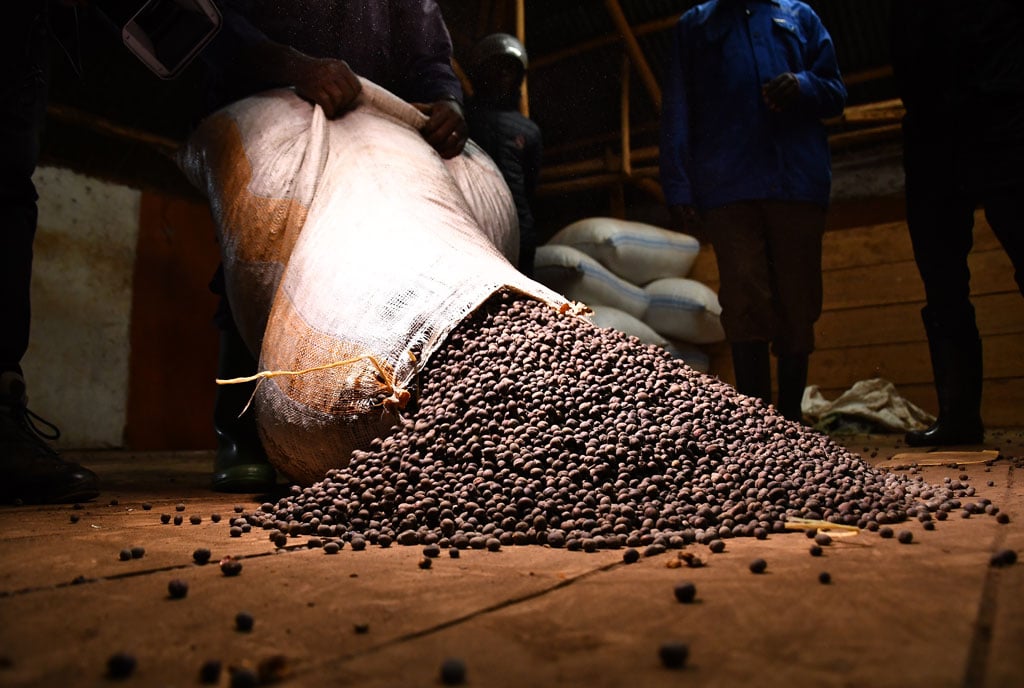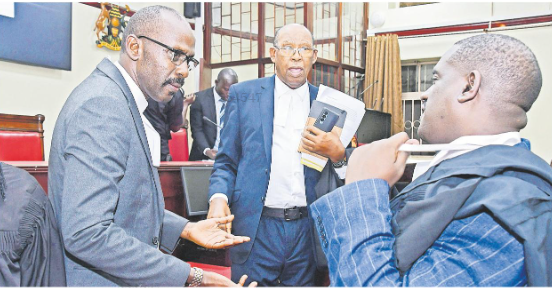
A man walks from a closed gate of the abandoned warehouse at the border export zone in Masafu town in Busia District. Photo | David Awori
A Shs1.8 billion border export zone at Masafu Town Council in Busia District remains closed two years after it was commissioned.
The project was constructed by the Ministry of Trade, Industry and Cooperatives under the Regional Integration Implementation Programme for value addition, promotion of export trade and provision of employment to about 3,000 youth.
It was further fronted as the magic bullet to enable the country to engage in key cross-border initiatives, to promote integration in the East African Community (EAC), and the Common Market for Eastern and Southern Africa (COMESA).
Documents from the Ministry of Trade suggest that the country’s exports to regional markets increased from 42.1 per cent in 2008, to 47.027 per cent in 2011, and it was hoped that the construction of the border export market would increase export volumes to the EAC and COMESA markets.
Masafu Town Council chairman, Mr Sam Mangeni Okumu, says construction of the facility was greeted with excitement, but over the years, the project appears to have stalled.
“Whereas the border export promotion zone was constructed under public and private partnership, the district has done nothing to have the area developed,” he said in an interview on April 9.
Mr Okumu added that the district leadership was supposed to oversee the development of the area, which has not been done.
According to him, they were to ensure that meetings were convened, plots demarcated, electricity extended to the area, and roads opened on the 187-acre piece of land.
“This was a flagship project for the people of Busia District and the entire country because it was supposed to provide jobs to 3,000 youths and help farmers add value to their agricultural produce,” Mr Okumu further stated.
When construction of the project started around 2017, Mr Eric Mukisa, one of the youths in Masafu Town Council, relished being employed and earning an income to improve his standard of living, which he says has not happened.
Instead, Mr Mukisa says the warehouse has become a habitat for bats, leaving him wondering why the government would spend close to Shs2 billion to construct a “house for bats” when many youth lack jobs, while others have nowhere to sleep.
The national chairman of cross-border trade, Mr Godfrey Oundo Ogwabe, says many investors, including Trade Mark East Africa, had reportedly shown interest in developing the border export zone but were frustrated by district leadership.
The Busia District chairman, Mr Stephen Wasike Mugeni, said whereas some investors had shown interest in developing the export zone, their investment policy was unclear and didn’t show how the district was going to benefit.
“That is why I was reluctant to agree with their investment policy,” Mr Mugeni said.
Mr Julius Wandera Maganda, the former State Minister for the EAC and former Samia Bugwe South Member of Parliament, said the initial plan was to have small-scale factories for value addition, warehouses, customs point, and hotels, among other amenities, because Busia District is an area with higher internal returns to trade.
“The government thought we had traded more with Kenya than any other country in the region and came up with a master plan to have a modern export zone constructed. However, along the way, the policy changed as other regions questioned why all these facilities were being implemented in Busia District alone,” the ex-minister recalls.
He says a policy change saw various border areas, including Lwakhakha, Mpondwe, and Elegu, taking part of the facilities, while Busia settled for the warehouse, but wrangles between Masafu town council and Busia District, on who owns the project, have derailed its redevelopment plans.
The first standoff, according to Mr Maganda, started when the Uganda Roads Authority compensated residents during the construction of the Majanji-Busia road, which left Busia District thinking it should have been the one to get the funds, while Masafu town council, too, says it deserved the money.
In addition, Mr Maganda said, the issue of compensation and resettlement of the Project Affected Persons (PAPs) worsened the situation.
“Amidst these wrangles, no investor can invest in the border export zone, and that is why its development has stalled,” he added.
Amb Barbra Nekesa, the National Resistance Movement (NRM) national treasurer, said the land on which the border export zone was constructed has issues relating to squatters, which the government is beginning to look at.
“We are seeing how to compensate them so that they can relocate elsewhere,” Ms Nekesa said, adding that they are also pushing for the creation of an industrial park in Masafu, which to promote job creation for the youth.





